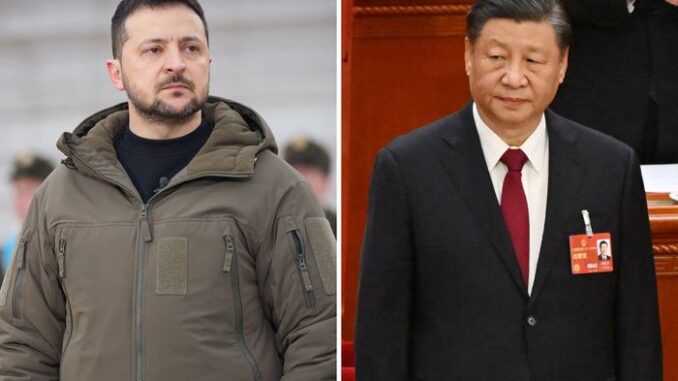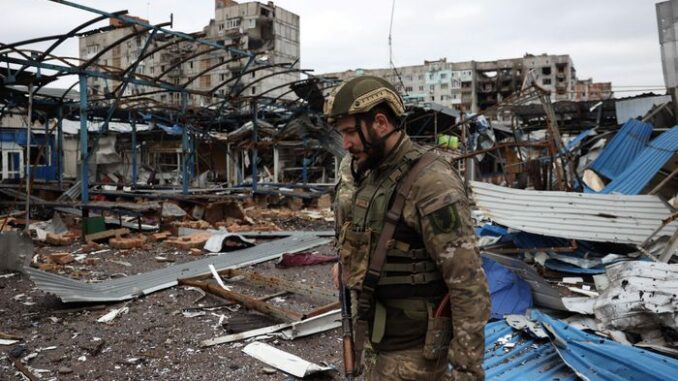Conversation follows Chinese leader’s meetings with Putin, as Beijing seeks a greater role in peace efforts

Ukrainian President Volodymyr Zelensky said he had ‘a long and meaningful phone call’ with Chinese leader Xi Jinping. PHOTO: UKRAINIAN PRESIDENTIAL PRESS SERVICE/
Chinese leader Xi Jinping called Ukrainian President Volodymyr Zelensky on Wednesday, their first conversation since the Russian invasion more than a year ago, as Beijing attempts to portray itself as a potential peacemaker in the conflict.
China’s Foreign Ministry said it would send a special representative for Eurasian affairs to Ukraine and other countries “for in-depth communication with all parties on the political settlement of the Ukrainian crisis.”
Mr. Zelensky said the two leaders had discussed ways to work together toward a “just and sustainable peace” for Ukraine during the hourlong conversation. He insisted that any settlement with Moscow must be based on the restoration of Ukraine’s borders to their status in 1991. “There can be no peace that is based on territorial compromises,” he said, according to his office’s account of the call.
Before its full-scale invasion of Ukraine last year, Russia had annexed the Crimean Peninsula and taken control over a swath of territory in the east of the country in 2014.
Mr. Zelensky said the call, as well as the appointment of a Ukrainian ambassador to China on Wednesday, would help develop ties between the two countries.
A presidential decree on Wednesday appointed Pavlo Riabikin, who was previously Ukraine’s minister of strategic industries, as ambassador to China. For the past two years, Ukraine has been represented in China by a chargé d’affaires.
“Now that the number of rational thoughts and voices is increasing, all parties should seize the opportunity to accumulate favorable conditions for a political solution to the crisis,” Mr. Xi told Mr. Zelensky, according to the Chinese Foreign Ministry’s account of the conversation. “We hope that all parties will reflect deeply on the crisis in Ukraine and, through dialogue, seek a common way for the long-term stability of Europe.”
The call followed Mr. Xi’s three-day trip last month to Russia, where he and Russian President Vladimir Putin deepened their nation’s political and economic ties as well as their longstanding personal friendship in their 40th meeting as leaders.
Mr. Putin praised China’s peacemaking initiative, saying after his meetings with Mr. Xi that many parts of it were “consonant with Russian approaches.”
China’s initiative, outlined in a 12-point position paper, has been largely dismissed by the U.S. and Europe, with officials saying China appears to heavily favor Russia’s position. Beijing has accused the U.S. of fueling the conflict by providing arms to Ukraine and rejecting Chinese efforts at a settlement.
Ukrainian officials have been cautious, welcoming the first point of China’s initiative, which calls for the sovereignty and territorial integrity of all countries to be upheld, but not touching upon the rest.
Dmytro Kuleba, the Ukrainian foreign minister, emphasized Ukraine’s own peace proposal during a telephone call last month with his Chinese counterpart, Qin Gang. That plan includes demands for the restoration of Ukraine’s borders and removal of all Russian troops—points not made in China’s position paper.
Some of China’s other points, such as the view that no country’s security efforts should come at the expense of its neighbors and criticism of reliance on security blocs, echo the Kremlin’s arguments for its invasion of Ukraine. The position paper also criticizes unilateral sanctions, which the U.S., Europe and other countries have used to punish Russia for the invasion.
The White House said the Xi-Zelensky call was overdue, though whether it would lead to meaningful peace negotiations is largely up to Ukraine.
“We’ve been saying for quite some time that we believe it’s important for President Xi and PRC officials to avail themselves of the Ukraine perspective on this illegal, unprovoked invasion by Russia,” National Security Council spokesman John Kirby said, referring to the People’s Republic of China.
To the degree the phone call did that, he told reporters, “that’s a good thing.”

A Ukrainian serviceman this week in Bakhmut, which Russia is fighting to capture. PHOTO: ANATOLII STEPANOV/AGENCE FRANCE-PRESSE/GETTY IMAGES
China’s effort to position itself as a mediator in Ukraine got a boost from its success last month in shepherding a deal between Iran and Saudi Arabia to resume diplomatic ties after seven years of estrangement.
A settlement in Ukraine appears far more elusive. Some analysts have described China’s Ukraine overture as cover for deepening its relationship with Russia. Messrs. Xi and Putin declared their countries had a “no limits” friendship shortly before Moscow launched the Ukraine war last year. In Moscow last month, they signed 10 agreements on economic ties until 2030.
Mr. Xi’s efforts on Ukraine will likely find more support in the developing world, where views on the war are more mixed and tolerance of Russia’s actions is greater than in the West.
Mr. Zelensky said in March that he hoped to meet with Mr. Xi. China hasn’t publicly responded to that offer, and Wednesday’s statement by China’s Foreign Ministry didn’t mention any such plans.
On the battlefield, prospects for a cease-fire appear unlikely as Russian forces make a grinding push for the city of Bakhmut and the Ukrainian military prepares for a spring counteroffensive.
The call between Messrs. Xi and Zelensky follows a string of high-level visits by European leaders to Beijing, including European Commission President Ursula von der Leyen and Emmanuel Macron of France. Mr. Macron used his visit earlier this month to ask the Chinese leader to engage with his Ukrainian counterpart, a senior French official said.
Other European officials have raised the issue also with Mr. Xi, including Ms. von der Leyen.
Mr. Macron proposed that Mr. Xi call Mr. Zelensky as part of an effort to involve Beijing in halting Russia’s aggression, and Mr. Xi agreed to do so, said the official, who was present at the meeting earlier this month.
The discussions followed a conversation between Messrs. Macron and Zelensky in February, when the French leader offered to host a peace conference in Paris for Ukraine, according to two people familiar with the conversation.
Mr. Zelensky responded that he would only attend if President Biden and Mr. Xi would also participate, leading to Mr. Macron’s bid to involve the Chinese leader.
The U.S. was initially dismissive of Beijing’s attempts to project itself as a potential mediator, pointing to closer Chinese relations with Moscow. The Biden administration has modulated its message in part, U.S. officials said, to avoid being outflanked by Beijing, which has tried to portray the U.S. as more interested in fanning the war than ending it.
Mr. Xi’s willingness to be directly involved in pushing for a resolution to the war suggests China expects to see at least modest results, said Raffaello Pantucci, a senior fellow at the S. Rajaratnam School of International Studies in Singapore.
“I would be surprised, if they’re touting Xi as the man point-guarding this, if something didn’t come out of it—because that would be a bit embarrassing for him,” he said. “Maybe it’s not peace in our time, but maybe it’s a small cease-fire or a handover of something.”
China faces clear difficulties in forging a lasting peace, as Mr. Putin appears intent on pressing on and Ukraine wants to recover all its lost territory.
“For a broker to come in and say ‘we’re going to bring peace,’ they’d have to push those people to make decisions that they don’t want to make,” Mr. Pantucci said. “I struggle to see Beijing doing that.”
The call comes days after China’s ambassador to France stirred a furor in Europe by questioning whether the Ukrainian peninsula of Crimea, which is occupied by Russia, was Ukrainian and saying that the sovereignty of ex-Soviet countries wasn’t effectively anchored in international law.
Chinese officials moved swiftly after the ambassador’s comments to reassure European capitals that China’s support of the sovereignty of former Soviet Republics hadn’t changed.
Bojan Pancevski, Isabel Coles and Georgi Kantchev contributed to this article.
Write to Austin Ramzy at austin.ramzy@wsj.com



China is provoking a shooting war — again